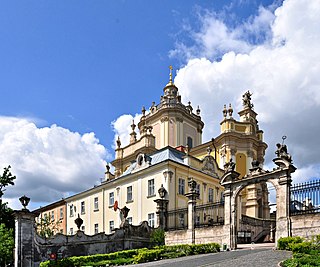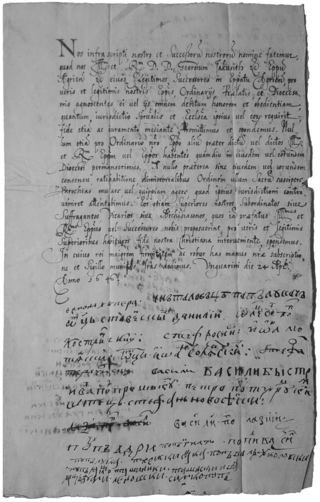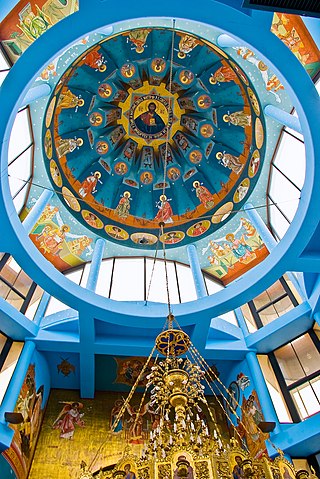
Ruthenian and Ruthene are exonyms of Latin origin, formerly used in Eastern and Central Europe as common ethnonyms for East Slavs, particularly during the late medieval and early modern periods. The Latin term Rutheni was used in medieval sources to describe all Eastern Slavs of the Grand Duchy of Lithuania, as an exonym for people of the former Kievan Rus', thus including ancestors of the modern Belarusians, Rusyns and Ukrainians. The use of Ruthenian and related exonyms continued through the early modern period, developing several distinctive meanings, both in terms of their regional scopes and additional religious connotations.

The history of Christianity in Ukraine dates back to the earliest centuries of the history of Christianity, to the Apostolic Age, with mission trips along the Black Sea and a legend of Andrew the Apostle even ascending the hills of Kiev. The first Christian community on territory of modern Ukraine is documented as early as the 9th century with the establishment of the Metropolitanate of Gothia, which was centered in the Crimean peninsula. However, on territory of the Old Rus in Kiev, Christianity became the dominant religion since its official acceptance in 989 by Vladimir the Great, who brought it from Byzantine Crimea and installed it as the state religion of medieval Kievan Rus (Ruthenia), with the metropolitan see in Kiev.
Ruthenian or Ruthene may refer to:

The Ukrainian Greek Catholic Church (UGCC) is a major archiepiscopal sui iuris ("autonomous") Eastern Catholic church that is based in Ukraine. As a particular church of the Catholic Church, it is in full communion with the Holy See. It is the second-largest particular church in the Catholic Church after the Latin Church. The major archbishop presides over the entire Church but is not distinguished with the patriarchal title. The incumbent Major Archbishop is Sviatoslav Shevchuk.

The Union of Brest took place in 1595-1596 and represented an agreement by Eastern Orthodox Churches in the Ruthenian portions of the Polish–Lithuanian Commonwealth to accept the Pope's authority while maintaining Eastern Orthodox liturgical practices, leading to the formation of the Ruthenian Uniate Church, which currently exists as the Ukrainian Greek Catholic Church and the Belarusian Greek Catholic Church.

The Ruthenian Greek Catholic Church, also known as the Byzantine Catholic Church in the United States, is a sui iuris (autonomous) Eastern Catholic church based in Eastern Europe and North America. As a particular church of the Catholic Church, it is in full communion with the Holy See. It uses the Byzantine Rite for its liturgies, laws, and cultural identity.
Ukrainian Orthodox Church most commonly refers to:

The Catholic Church in Ukraine is part of the worldwide Catholic Church, under the spiritual leadership of the Pope in Rome. Catholics make up 10% of the population of Ukraine.

The Order of Saint Basil the Great, also known as the Basilian Order of Saint Josaphat, is a Greek Catholic monastic order of pontifical right that works actively among Ukrainian Catholics and other Greek-Catholic churches in central and Eastern Europe. The order received approbation on August 20, 1631, and is based at the Monastery of the Holy Trinity, Vilnius.

The Union of Uzhhorod, was a decision by 63 Ruthenian priests of the Orthodox Eparchy of Mukachevo to join the Catholic Church made on April 24, 1646. Until rediscovery of its founding document in 2016, academics had debated the actual date of union, whether a document had been signed, and even whether the Union of Uzhhorod had even transpired at all.
Orientales omnes Ecclesias is an encyclical of Pope Pius XII to the faithful of the Ukrainian Greek Catholic Church. It commemorates the three hundred and fiftieth anniversary of the Union of Brest.

The Conversion of Chełm Eparchy was the forced conversion of the Eparchy of Chełm–Belz that took place between January and May 1875. It was the last eparchy of the Ruthenian Uniate Church that remained on the territory of the Russian Empire following the partitions of Poland. The episcopal seat of the eparchy was in the city of Chełm (Kholm) in Congress Poland. Adherents and clergy were forced to join the Russian Orthodox Church.
Ruthenian Orthodox Church may refer to:
The Archeparchy of Polotsk-Vitebsk was an archeparchy of the Ruthenian Uniate Church that was situated in the Polish–Lithuanian Commonwealth. From 1596 to 1839, it was a suffragan eparchy of the Metropolis of Kiev, Galicia and all Ruthenia. The cathedral church of the archeparchy was Cathedral of Saint Sophia in the city of Polotsk.

The Ruthenian Uniate Church was a particular church of the Catholic Church in the territory of the Polish–Lithuanian Commonwealth. It was created in 1595/1596 by those clergy of the Eastern Orthodox Church who subscribed to the Union of Brest. In the process, they switched their allegiances and jurisdiction from the Ecumenical Patriarchate of Constantinople to the Holy See.
Ruthenian Catholic Church may refer to:
Greek Catholic Church may refer to:
Metropolis of Pittsburgh may refer to:
Metropolis of Kiev is an episcopal title that has been created with varying suffixes at multiple times in different Christian churches, though always maintaining the name of the metropolitan city — Kiev (Kyiv) — which today is located in the modern state of Ukraine. Following the Council of Florence and the Union of Brest, there are now parallel apostolic successions: in the Russian Orthodox Church, the Orthodox Church of Ukraine, the Ruthenian Uniate Church and its successors. They include:
This page is based on this
Wikipedia article Text is available under the
CC BY-SA 4.0 license; additional terms may apply.
Images, videos and audio are available under their respective licenses.









